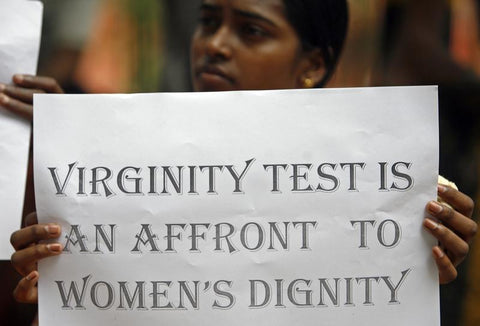Virginity Tests Should Not Be Up For Debate
Something old, something new, something borrowed, something blue - and something to test whether you have lost your virginity. Yes, you read that last part right.
Virginity testing, also known as a 'two-finger', or hymen/per vaginal examination, is an ‘inspection of the female genitalia meant to determine whether a woman or girl has had vaginal intercourse’ (WHO). Traditionally, it is unmarried women and girls that virginity tests are performed on; in order to form an impression on their social status, value, honour, and morality.
As archaic as this procedure sounds, it is still very much commonplace in many areas of the world today. Egyptian journalist, Mona Eltahawy, focuses on the preoccupation of purity and virginity in Arab culture in her book, Headscarves and Hymens: Why the Middle East Needs a Sexual Revolution. Eltahawy details that virginity is a "countable commodity" and that "everything possible is done to keep the hymen". Some girls resort to inserting unhygienic items such as freshly cut meat into the vagina to resemble a hymen-like "white veil", which can lead to local trauma, bleeding and infection.
Basing a woman’s value on her sexual experience and a spectrum of purity drives girls to fearfully save their virginity for marriage. In some cases, women and girls are murdered if a hymen is found to not be present through ‘honour killings’. The Halo Project Charity, a national project that supports victims of honour-based violence, forced marriages, and FGM, states that there are approximately 12 honour killings a year in the United Kingdom. The charity also mentions that this does not take into account the statistics of people that are taken abroad who do not return, or schoolchildren that are sent abroad for the purpose of marriage.
Despite the heavy focus on virginity testing in Middle Eastern cultures, the United Kingdom is also complicit. In 1979, it became public knowledge from a report by The Guardian that around 80 South Asian women had been given virginity tests by immigration officers at Heathrow airport. It was reported by the Home Office that immigration officers would also ask medical inspectors if they “can determine whether the passenger has borne children which could be relevant to his decision whether a passenger should be admitted", reaping prejudice and indignity in the British immigration system and the sexual health of women.

Credit photo: hrw.org
The concept of virginity is a social, religious and cultural construct, which raises the question as to why healthcare services provide the means to test it, if it is not medically or scientifically viable. Hymen reconstruction surgery, or a hymenoplasty, is just as readily available as virginity testing. Costing around £800, the procedure artificially restores the hymen and is designed to mimic the look of a virgin vagina which will bleed during penetrative sex. In a more accessible route, artificial hymen kits are being sold widely online. Healthcare workers have a huge impact on these procedures; the longer virginity testing and hymenoplasties are advocated, the likelihood of them being socially acceptable increases.
It’s been established that there is no scientific evidence to support beliefs that the appearance of the hymen is a reliable factor of determining vaginal intercourse, but that doesn’t stop some overburdening parents, such as the rapper T.I, push their daughters to take virginity tests and healthcare professionals to provide them. In 2019, T.I revealed that during his daughter’s annual gynaecological check-up, he made the doctor “check whether her hymen [was] still intact.” It’s worth noting that the term ‘intact hymen’ has no scientific validity; there is no anatomical correlation to it due to injuries to the hymen healing rapidly.
Virginity testing is founded in myths propelled by body-politics, and is now recognised as an abusive, medically unnecessary practice that is not only detrimental to the health of girls and women around the world, but violates international human rights. These myths disempower women worldwide and allow female sexuality to be defined by the actions of a man; with the hymen being some form of measurement.
The effects on well-being of virginity testing are physical and psychological just as much as they are sociological. The examination violates privacy and sometimes consent, so its invasive nature can cause physical pain and bleeding. Intense anxiety, depression, loss of self-esteem, guilt, and damaged self-worth and body image are all common aftermaths.
Providers, policymakers, and communities all have a social responsibility in eradicating virginity testing and medical half-truths. If we really want to paddle against the flow of gender inequality, abusive practices cannot be left out of the fight just because they are too taboo to address. Failure to address is failure to progress. Gender equality means equality for all sexes. Virginity tests should not be up for debate when history is yet to dig up any methods of testing the virginities of men, while holding them accountable by the magnitude of death if their purity is not present.
Written by Sophie Hall


Leave a comment